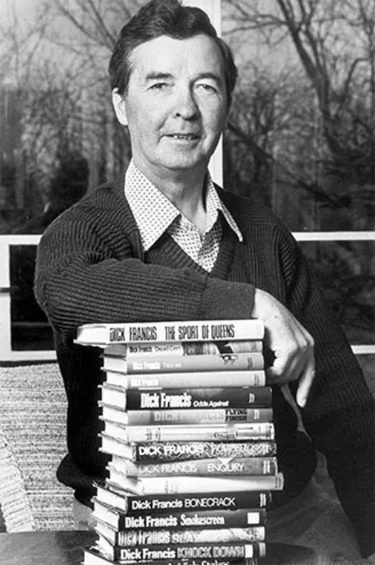At Crime Reads, Neil Nyren celebrates the inimitable Dick Francis.
Dick Francis was a master of the first line, the first paragraph, the first page. Once read, they hooked you immediately. Nothing would keep you from wanting to find out what happened next.
Take the opening of Straight (1989):
“I inherited my brother’s life. Inherited his desk, his business, his gadgets, his enemies, his horses and his mistress. I inherited my brother’s life, and it nearly killed me.â€
So much packed into three sentences. First, note the rule of three: inherited…inherited…inherited. Short-long-short-boom. How did his brother die? Were his enemies responsible? What was his business? His “gadgets� Wait, inherited his mistress? Nearly killed him? You’ve got to find out, don’t you?
A few other choice openers:
“I had told my drivers never on any account to pick up a hitchhiker, but of course one day they did, and by the time they reached my house, he was dead.†(Driving Force, 1992)
“Sadly, death at the races is not uncommon. However, three in a single afternoon was sufficiently unusual to raise more than an eyebrow.†(Under Orders, 2006)
“I intensely disliked my father’s fifth wife, but not to the point of murder.†(Hot Money, 1987)
“I was never particularly keen on my job before the day I got shot and nearly lost it, along with my life. But the .38 slug of lead that made a pepper shaker out of my intestines left me with fire in my belly in more ways than one.†(Odds Against, 1995)
“Fire in the belly†is an apt term for all of Francis’s heroes—maybe not at first, but once their sense of injustice is aroused, they are driven. Most of them are ordinary blokes with a keen morality and, once spurred, they prove to be more courageous and resourceful than they—or their enemies—had thought themselves to be. They’re often a bit damaged—physically, mentally, or both—stalwart yet sensitive men in the 30s, who come from dysfunctional families and are often single—divorced, widowed, in love with someone inappropriate (a relative, a friend’s wife) and thus unable to act on it—and if he’s married, it might be to someone with a debilitating condition that makes physical intimacy impossible. Francis never made it easy for his heroes (though sometimes he let them meet someone romantically suitable by the end of the book).
The heroes were almost always different—Francis repeated only two characters during all of his 40 books from 1962 to 2006—jockey Kit Fielding, who appeared in two books, and jockey-turned-investigator Sid Halley, who appeared in three (plus one written by Francis’s son, Felix). Halley is a true exemplar of a Francis hero, a man intelligent and principled, with a hand terribly injured in a racing accident, the sight of it enough to make new acquaintances gasp, who finds bravery and his true calling in the midst of a storm of adversity.






Lee
I’ve read all of Dick Francis’s mysteries. One thing I loved was that I always learned something new. Initially, it was learning about horse racing and turf accounting, but in his later novels, he’d introduce characters that were involved in something else. I learned about scotch and wholesale liquor in “Proof,” and about photography in “Reflex.” I always thought they’d make great movies, but the one I did see was not very good. Maybe my imagination is better than film produces…
Please Leave a Comment!